19_九 Units 7_8【2022年中考英语一轮复习教材分册精讲精练】课件(共46张PPT)
文档属性
| 名称 | 19_九 Units 7_8【2022年中考英语一轮复习教材分册精讲精练】课件(共46张PPT) |
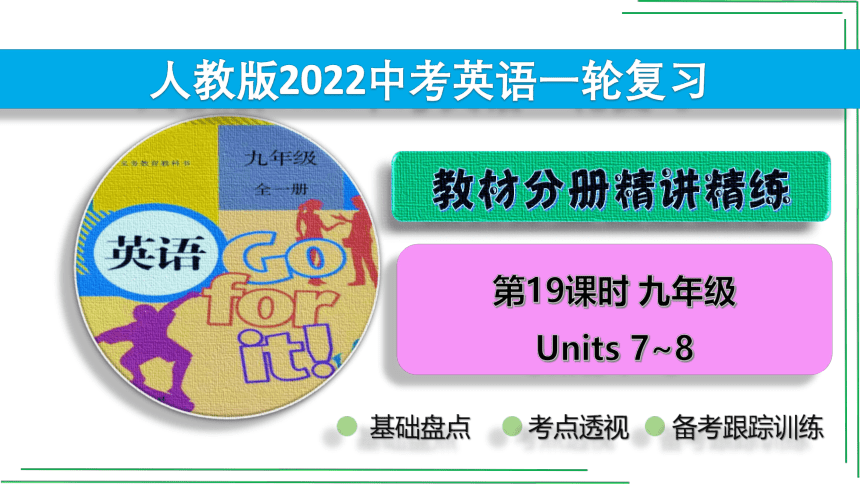
|
|
| 格式 | pptx | ||
| 文件大小 | 4.2MB | ||
| 资源类型 | 试卷 | ||
| 版本资源 | 人教新目标(Go for it)版 | ||
| 科目 | 英语 | ||
| 更新时间 | 2022-01-30 00:00:00 | ||
图片预览

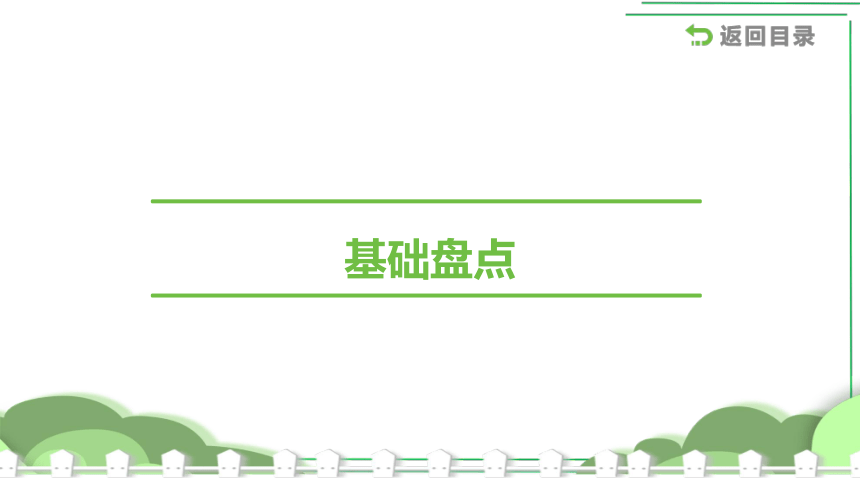
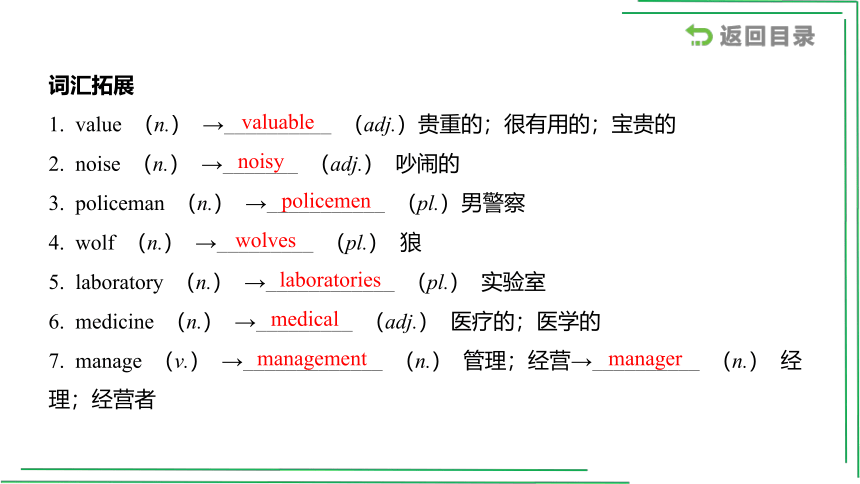
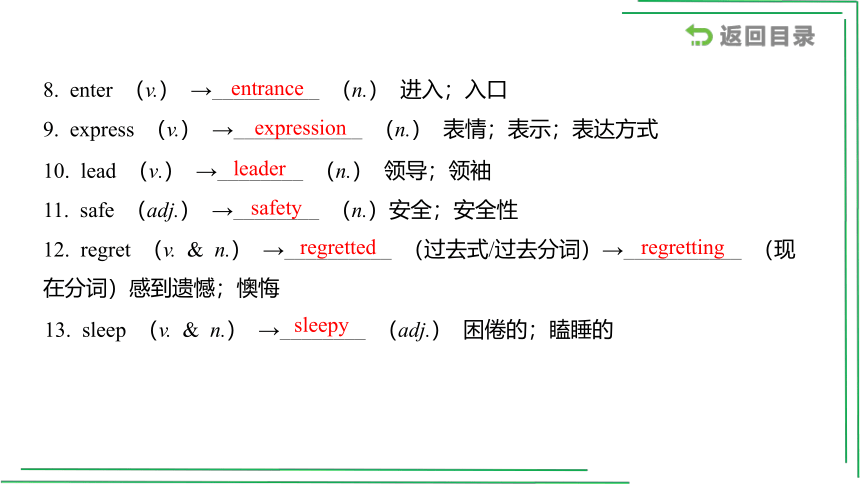
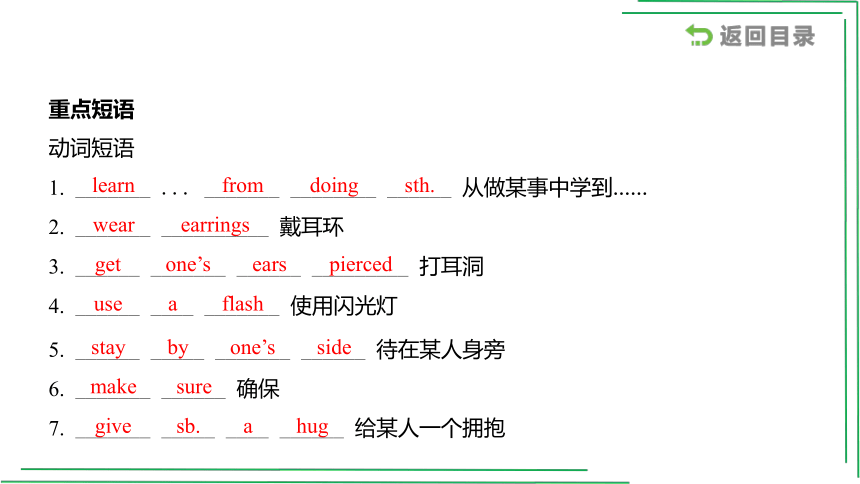
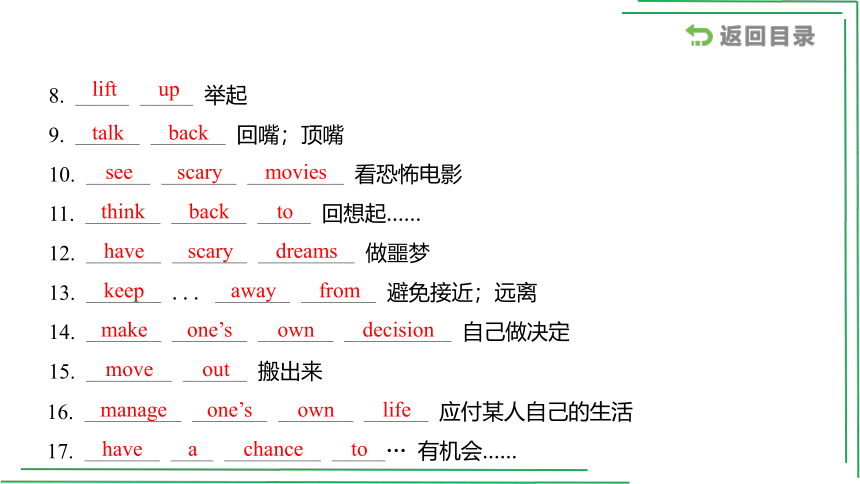
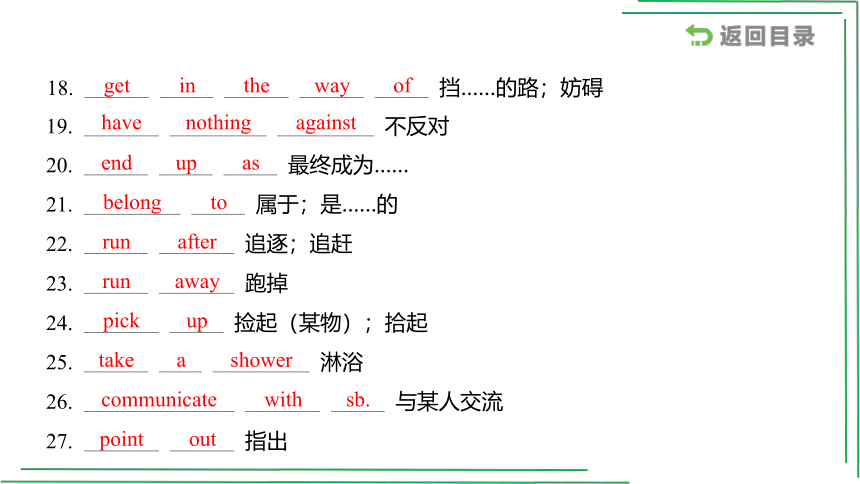
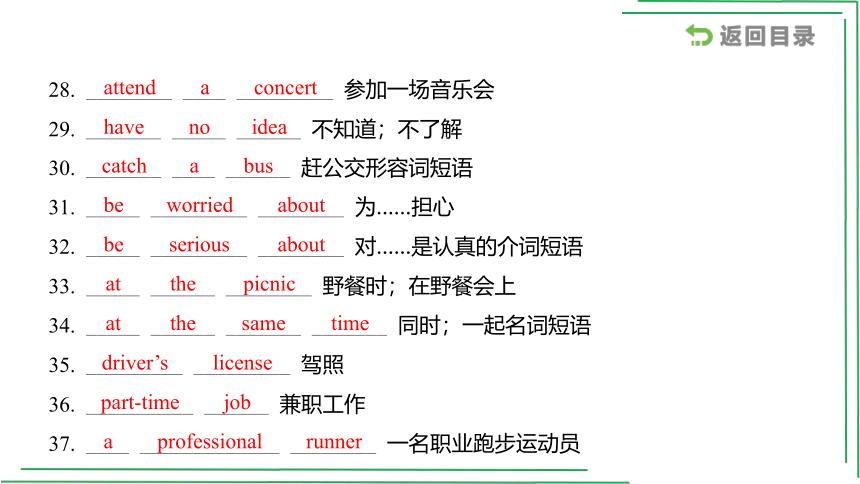
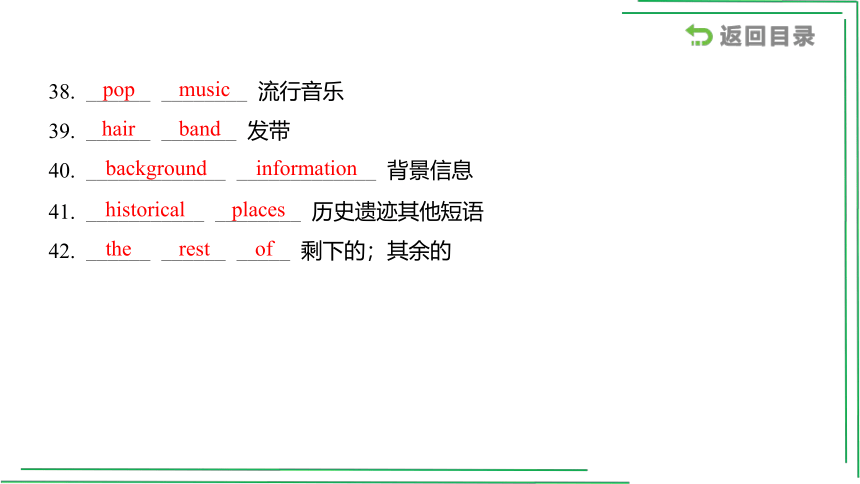
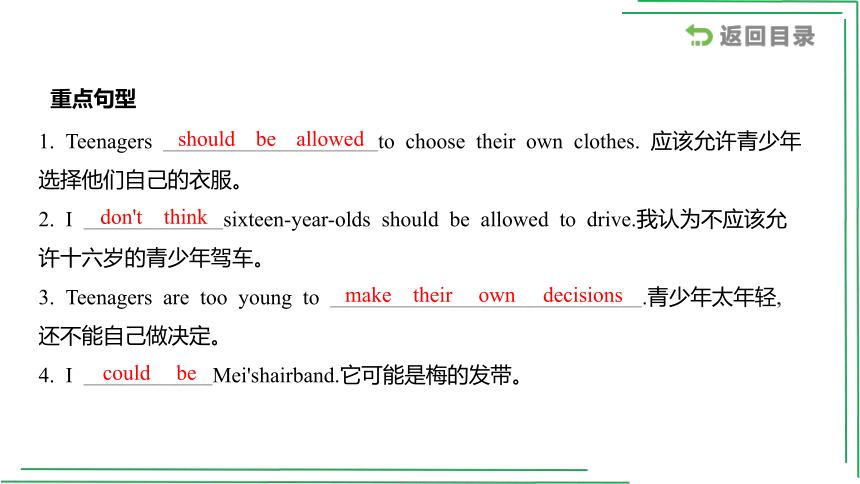
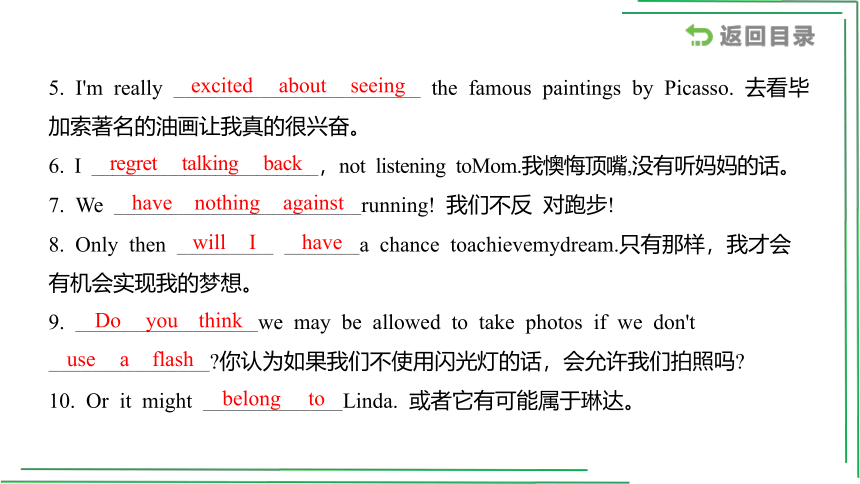
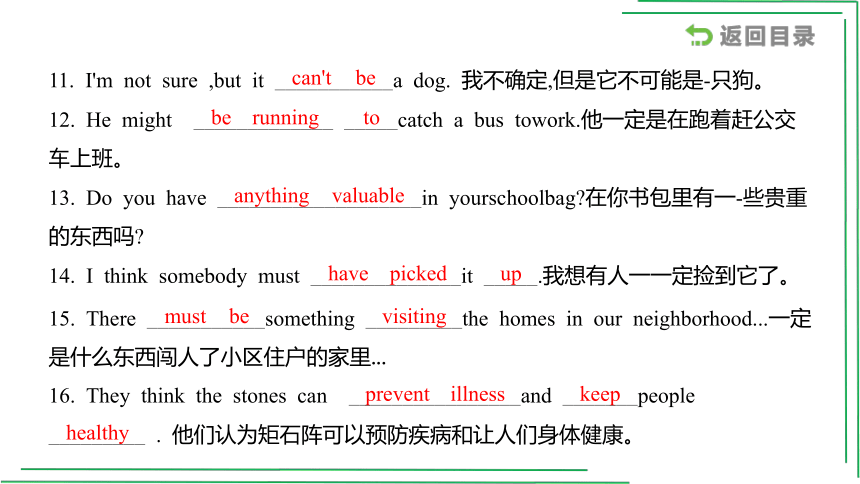
文档简介
(共46张PPT)
人教版2022中考英语一轮复习
教材分册精讲精练
第19课时 九年级
Units 7~8
基础盘点
考点透视
备考跟踪训练
基础盘点
词汇拓展
valuable
noisy
policemen
wolves
laboratories
medical
management
manager
1. value (n.) →__________ (adj.)贵重的;很有用的;宝贵的
2. noise (n.) →_______ (adj.) 吵闹的
3. policeman (n.) →___________ (pl.)男警察
4. wolf (n.) →_________ (pl.) 狼
5. laboratory (n.) →____________ (pl.) 实验室
6. medicine (n.) →_________ (adj.) 医疗的;医学的
7. manage (v.) →_____________ (n.) 管理;经营→__________ (n.) 经理;经营者
9. express (v.) →____________ (n.) 表情;表示;表达方式
8. enter (v.) →__________ (n.) 进入;入口
entrance
expression
leader
10. lead (v.) →________ (n.) 领导;领袖
safety
11. safe (adj.) →________ (n.)安全;安全性
regretted
regretting
12. regret (v. & n.) →__________ (过去式/过去分词)→___________ (现在分词)感到遗憾;懊悔
sleepy
13. sleep (v. & n.) →________ (adj.) 困倦的;瞌睡的
重点短语
动词短语
learn
from
doing
sth.
1. _______ ... _______ ________ ______ 从做某事中学到……
wear
earrings
2. _______ __________ 戴耳环
get
one’s
ears
pierced
3. ______ _______ ______ _________ 打耳洞
use
a
flash
4. ______ ____ _______ 使用闪光灯
stay
by
one’s
side
5. ______ _____ _______ ______ 待在某人身旁
make
sure
6. _______ ______ 确保
give
sb.
a
hug
7. _______ _____ ____ ______ 给某人一个拥抱
8. _____ _____ 举起
talk
back
9. ______ _______ 回嘴;顶嘴
see
scary
movies
10. ______ _______ _________ 看恐怖电影
think
back
to
11. _______ _______ _____ 回想起……
have
scary
dreams
12. _______ _______ _________ 做噩梦
keep
away
from
13. _______ ... _______ _______ 避免接近;远离
make
one’s
own
decision
14. _______ _______ _______ __________ 自己做决定
move
out
15. ________ ______ 搬出来
lift
up
manage
one’s
own
life
16. _________ _______ _______ ______ 应付某人自己的生活
have
a
chance
to
17. _______ ____ _________ _____… 有机会……
get
in
the
way
of
18. ______ _____ ______ ______ _____ 挡……的路;妨碍
have
nothing
against
end
up
as
belong
to
run
after
run
away
pick
up
take
a
shower
communicate
with
sb.
point
out
19. _______ _________ _________ 不反对
20. ______ _____ _____ 最终成为……
21. _________ _____ 属于;是……的
22. ______ _______ 追逐;追赶
23. ______ _______ 跑掉
24. _______ _____ 捡起(某物);拾起
25. ______ ____ _________ 淋浴
26. ______________ _______ _____ 与某人交流
27. _______ ______ 指出
attend
a
concert
have
no
idea
28. ________ ____ _________ 参加一场音乐会
29. _______ _____ ______ 不知道;不了解
catch
a
bus
30. _______ ____ ______ 赶公交形容词短语
be
worried
about
31. _____ _________ ________ 为……担心
be
serious
about
32. _____ _________ ________ 对……是认真的介词短语
at
the
picnic
33. _____ ______ ________ 野餐时;在野餐会上
at
the
same
time
34. _____ ______ _______ _______ 同时;一起名词短语
driver’s
license
35. _________ _________ 驾照
part-time
job
36. __________ ______ 兼职工作
a
professional
runner
37. ____ _____________ ________ 一名职业跑步运动员
pop
music
38. ______ ________ 流行音乐
hair
band
39. ______ _______ 发带
background
information
40. _____________ _____________ 背景信息
historical
places
41. ___________ ________ 历史遗迹其他短语
the
rest
of
42. ______ ______ _____ 剩下的;其余的
should
be
allowed
1. Teenagers ____________________to choose their own clothes. 应该允许青少年选择他们自己的衣服。
don't
think
2. I _____________sixteen-year-olds should be allowed to drive.我认为不应该允许十六岁的青少年驾车。
make
their
own
decisions
3. Teenagers are too young to _____________________________.青少年太年轻,还不能自己做决定。
could
be
4. I ____________Mei'shairband.它可能是梅的发带。
重点句型
5. I'm really _______________________ the famous paintings by Picasso. 去看毕加索著名的油画让我真的很兴奋。
regret
talking
back
6. I ______________________,not listening toMom.我懊悔顶嘴,没有听妈妈的话。
have
nothing
against
7. We _______________________running! 我们不反 对跑步!
excited
about
seeing
will
I
have
Do
you
think
use
a
flash
belong
to
8. Only then _________ _______a chance toachievemydream.只有那样,我才会有机会实现我的梦想。
9. _________________we may be allowed to take photos if we don't _______________ 你认为如果我们不使用闪光灯的话,会允许我们拍照吗
10. Or it might _____________Linda. 或者它有可能属于琳达。
be
running
to
anything
valuable
have
picked
up
11. I'm not sure ,but it ___________a dog. 我不确定,但是它不可能是-只狗。
12. He might _____________ _____catch a bus towork.他一定是在跑着赶公交车上班。
13. Do you have ___________________in yourschoolbag 在你书包里有一-些贵重的东西吗
14. I think somebody must ______________it _____.我想有人一一定捡到它了。
can't
be
must
be
visiting
15. There ___________something _________the homes in our neighborhood...一定是什么东西闯人了小区住户的家里...
prevent
illness
keep
16. They think the stones can ________________and _______people _________ . 他们认为矩石阵可以预防疾病和让人们身体健康。
healthy
1.含有情态动词的被动语态(见P147)
2.情态动词表推测的用法(must,can't,might,could)(见P141)
核心语法
考点透视
考点一 I regret talking back,not listening to Mom. 我后悔跟妈妈顶嘴,没有听妈妈的话。
regret的用法
I regret to have to do this,but I have no choice. 我很遗憾必须这样做,但我实在没有选择。
I don’t regret telling her what I thought. 我不后悔告诉她我的想法。
I regret that I have wasted a lot of time. 我后悔我浪费了许多时间。
【考点抢测】
1.We regret _____ you that 11:00 flight to Beijing has been cancelled because of the bad weather.
A. to tell B. tell C. telling D. tells
A
2.—Did you talk back to your mother when you were a child
—Yes. But now I realize I was wrong. I really regret _____ that silly thing to my mom.
A. do B. to do C. doing D. did
C
3.He regretted __________ (break) the window of the classroom yesterday afternoon.
breaking
考点二 This way, when they start working they can manage their own lives. 这样,当他们开始工作时,他们就能过好自己的生活。
辨析manage与try
考点 含义及用法 例句
manage manage to do sth. =succeed in doing sth. ,表示“设法成功做成某事”,强调结果 In the end, the workers managed to finish the project on time. 最终,这些工人按时完成了这个项目。
try try to do sth. 表示“努力做某事”;try doing sth. 表示“尝试做某事”,两者强调动机,但结果并不明确 He tried to finish the project, but failed at last. 他试图完成这个项目,但是最终失败了。
【考点抢测】
4.—I’m tired out. I have stayed up late the whole week.
—You’d better _____ your time better and have things organized.
A. make B. have C. take D. manage
D
5.Nobody answers the front door. Let’s _____ the back door.
A. manage knocking B. try knocking C. manage to knock D. try to knock
B
6.Though the time was almost running out, we still managed __________(reach) the airport on time.
to reach
7.One of the secrets to be happy is to try ____________ (develop) good relationships with people around you.
to develop
考点三 Every year it receives more than 750,000
visitors. 每年这里接待75万多名游客。
辨析receive与accept
考点 含义及用法 例句
receive “接到、收到”,表示客观上收到,与主观意愿无关 Nancy received the present from her dad. 南希收到了她爸爸送的礼物。
accept “接受”,表示其行为是由主观意愿决定的 I didn’t accept his apology. 我没有接受他的道歉。
【考点抢测】
8.Dan _____ an iPad as a birthday gift from his cousin, but he didn’t __ it because it was too expensive.
A. received;accept
B. accepted;receive
C. received;receive
D. accepted;accept
A
9.—Why didn’t you _____ my help just now
—I could do it all by myself.
A. receive B. accept C. check D. break
B
10.我们受到了主人的热情欢迎。
We __________________________ from the hosts.
received a warm welcome
11.他总是乐于接受挑战。
He is always ready to ___________________.
accept a challenge
备考跟踪训练
一、单项选择。
1.—I wonder if this glass is Tom’s.
—It _____ be his. His was broken just now.
A. mustn’t B. may not C. can’t D. shouldn’t
C
2.—Wow, so many ties! What do you think of this one
—Well, it’s a wise _____ to wear the white tie. It matches your shirt well.
A. chance B. choice C. mind D. agreement
B
3.—Anne, the information you gave is really _____. Thank you very much.
—Not at all. I am happy I can help you.
A. useless B. ordinary C. valuable D. interesting
C
4.Children, follow your heart and never let _____ steal your dreams.
A. someone B. anyone C. everyone
5.—Song of Autumn by Liu Yuxi describes autumn in a different way.
—I agree. Most poets (诗人) describe this season to _____ a feeling of sadness, but in Liu’s eyes autumn is full of life and hope.
A. excuse B. express C. expect D. explain
B
6.The doctors and nurses managed _____ the lives of patients, though they didn’t have enough medicine.
A. save B. saving C. to save D. to saving
C
B
7.Drugs are harmful to people’s physical and mental health. We teenagers must _____ them.
A. take care of B. keep away from C. get used to D. come up with
B
8.—What does the sign on the right tell us
—Oh, it tells us that we _____ to stop our cars here.
A. don’t allow B. aren’t allowed
C. didn’t allow D. weren’t allowed
B
二、完形填空。
You may have read how Thomas Smith first raised rice in Carolina. After his death, there lived in South Carolina a wise young woman. She was . .1. . by American people because she raised . .2. . plant.
Her name was Eliza Lucas, whose father was governor of an island of the West Indies. Lucas had a . .3. . of trying new things. She often got . .4. . seeds(种子) from her father and planted them in South Carolina. Her father sent her some seeds of the indigo(靛蓝色的) plant. She planted some of these in March and the seeds came up soon, but a . .5. . cold killed all the young plants. But Miss Lucas did not . .6. .. She planted some more in April. But a cut-worm found them and . .7. . the indigo plants. But Miss Lucas was one of the people who try, try again. Though she had . .8. . her indigo plants twice, once more she . .9. . and this time the plants grew very well.
Her father was so . .10. . to hear that and sent her a man who knew how to grow the plant well. The man did not want the people in South Carolina to learn how to make it. So he would not . .11. . how it was done. But Miss Lacas watched him . .12. . and learned it.
Some of her father’s land in South Carolina was now planted with the indigo plans. Then Miss Lucas was . .13. .. She became Mrs. Pinckney. Her father gave her all the indigo growing on his land in South Carolina. It was all . .14. . for seed. She gave the seed to other farmers. It all grew and was made into something that we call indigo. When it is used in washing clothes, it is called bluing.
In a few years, more than a million pounds of indigo were made in South Carolina every year. Many people started up . .15. . from it, and it was all because Miss Lucas did not give up.
1.( )A. killed B. believed C. honored D. protected
C
2.( )A. other B. another C. one D. some
B
3.( )A. hobby B. humor C. decision D. problem
A
4.( )A. best B. different C. fresh D. common
B
5.( )A. famous B. main C. sudden D. usual
C
6.( )A. give up B. bring up C. make up D. come up
A
7.( )A. sold B. burnt C. bought D. ate
D
8.( )A. lost B. planted C. raised D. cut
A
9.( )A. failed B. succeeded C. continued D. realized
C
10.( )A. disappointed B. pleased C. worried D. frightened
B
11.( )A. notice B. report C. watch D. explain
D
12.( )A. simply B. bravely C. nearly D. closely
D
13.( )A. dead B. rich C. married D. crazy
C
14.( )A. sold B. saved C. heated D. recorded
B
15.( )A. energy B. courage C. chance D. business
D
三、阅读理解。
(2021,德州)We see humans all around us. But when was the first human seen Early humans did not leave behind any written records. However, they left behind many paintings on the walls of the caves(洞穴) where they lived. These paintings tell about their life, and we know these early humans walked on four limbs(四肢) like apes(猿). Also, they did not live at one place but moved from place to place in search of food and water.
Without any tools, early humans used stones, bones of animals, and sharp pieces of wood to dig, hunt and cut their food. They also used these to protect themselves from animals. Since stones were used to make tools, this age was called Stone Age.
With time going, tools made of bones and stones were replaced with metal(金属的) ones which were stronger, sharper, and long-lasting. Metals were also used for farming and making knives. Copper(铜) was the first metal to be used.
The first fire that early humans noticed was natural fire caused by lightning(闪电). With fire, early humans could now light up dark caves. They could keep themselves warm during cold weather and cook meat. Also the fire could drive animals away.
Early humans noticed new trees growing from the seeds(种子) that fell to the ground from the fruits. This gave them the idea that they could make their own food by planting seeds, which led to farming. With the beginning of farming, early humans began to settle down(定居). They moved out of the caves and lived on farms and near their fields together, then the first villages came up.
Raising animals was a big event in human history that changed the life of early humans. The wild dogs were probably the first animal to be raised. As time went, goats, sheep, cows, donkeys, and horses were kept, too. This led to herding(畜牧业). Milk, meat and wool came from these animals.
A
1.Early humans’ paintings don’t tell us _____.
A. when the first human appeared B. how they walked
C. where they lived D. how they lived
C
2.Early humans had to move around in order to _____.
A. find more caves to live in B. protect themselves from animals
C. look for food and water D. make kinds of tools
A
3.Early humans used fire to _____.
① light up dark caves ② keep themselves warm
③ cook meat ④ drive animals away ⑤ make knives
A. ①②③④ B. ①②④⑤ C. ②③④⑤ D. ①②③⑤
4.Early humans were able to live in one place when _____.
A. they could walk on two feet B. they could use metals
C. they knew how to farm D. they knew how to use fire
C
5.Which statement is right according to the passage _____
A. The first tools were made of copper.
B. The first fire noticed by early humans was caused by lightning.
C. The first villages came up before the farming appeared.
D. The first animal to be raised was sheep.
B
四、任务型阅读。
Obey the rules of British roads
British roads are some of the safest in the world. A study in 2018 compared more than 30 countries and found that 3.8 people per 100,000 died in traffic accidents in the UK. This number was lower than any other country. So, what did British drivers do to achieve this What are they doing differently Here are five top tips for drivers who are planning a trip to the UK.
People in Britain drive on the left side of the road. In fact, a long time ago people drove on the left in most countries, but now only a few countries have this. Don’t forget that this also means you must drive the other way around roundabouts(环岛).
British people feel that waiting should be fair for everybody. If you are in a queue of traffic, then don’t try to push past the cars in front of yours. This is called “jumping the queue”. You must wait for your turn; otherwise people may get angry with you.
You must stop at the traffic lights when they are red. In many countries, it is OK to go past the red lights if you are turning a corner or if there isn’t any other traffic around. In the UK you could have a lot of trouble if you do this.
If another driver flashes(闪烁) his car’s lights at you, he is probably trying to tell you that he will wait for you to go first. British people don’t like to use their car horn(喇叭) much and they think people who do so are rude.
If you get in an accident, don’t try to pay the police. The police in the UK never take money, and if you try to offer them some, you could end your holiday visiting British prison.
阅读短文,简略回答问题。
1.How many tips are mentioned in the passage?
_________
Five/5.
2.Which side do British people drive on?
____________________
On the left(side).
3.If you jump the queue, how will other drivers feel?
____________________________________
They may feel/get angry(with you).
4.What does the driver probably mean if he flashes his car’s lights at you?
_________________________________________________
He will wait for you to go first./He will follow you.
5.If you give the police money, what will happen to you?
____________________
You’ll be in prison.
五、书面表达。
教育就是善意的干预。在我们的成长过程中时常会面
对来自父母或老师的提醒与批评,有的同学不理解,有的
甚至会有过激的反应。如何客观、冷静地对待这种问题,
需要我们认真、理性地思考,并做出合理应对,这正是教育要达到的目的。
请针对以上现象,结合生活中的经历,写一篇短文。
内容包括:●your opinion about this phenomenon (现象)
●an experience you had/heard/saw
●what you have learned from it
2.参考词汇仅供参考;
3.文中不得出现真实的人名、校名。
参考词汇:remind 提醒 criticize 批评 objective 客观的
calm 冷静的 reasonable 理性的
______________________________________________________________________________________________________________________________________________________________________
As far as I’m concerned, it is of great importance to stay calm and reasonable when our parents and teachers blame or criticize us, which is beneficial for our lifelong development.
要求:1.词数不少于80词;
_____________________________________________________________________________________________________________________________________________________________________________________________________________________________________________________________________________________________________________________________________________________________________________________________________________________________________________________________________________________________________
_____________________________________________________________________________________________________________________________________________________________________
It’s a good idea to keep calm and think about it for a moment whenever being blamed or criticized. Sometimes a small change of yourself may lead to a big difference to your life.
I still remember the day that I had an English class. Seeing Li Ming falling asleep, our teacher, Miss Hu, woke him up and reminded him to listen to her carefully. To my surprise, Li Ming rushed out of the classroom without permission. It was so impolite and rude to do so. Later, I talked with him and he realized that the teacher expected to help him develop a good habit and he wasn’t so calm at that time. Therefore, he picked up his courage and said sorry to Miss Hu in front of the whole class.
https://www.21cnjy.com/help/help_extract.php
人教版2022中考英语一轮复习
教材分册精讲精练
第19课时 九年级
Units 7~8
基础盘点
考点透视
备考跟踪训练
基础盘点
词汇拓展
valuable
noisy
policemen
wolves
laboratories
medical
management
manager
1. value (n.) →__________ (adj.)贵重的;很有用的;宝贵的
2. noise (n.) →_______ (adj.) 吵闹的
3. policeman (n.) →___________ (pl.)男警察
4. wolf (n.) →_________ (pl.) 狼
5. laboratory (n.) →____________ (pl.) 实验室
6. medicine (n.) →_________ (adj.) 医疗的;医学的
7. manage (v.) →_____________ (n.) 管理;经营→__________ (n.) 经理;经营者
9. express (v.) →____________ (n.) 表情;表示;表达方式
8. enter (v.) →__________ (n.) 进入;入口
entrance
expression
leader
10. lead (v.) →________ (n.) 领导;领袖
safety
11. safe (adj.) →________ (n.)安全;安全性
regretted
regretting
12. regret (v. & n.) →__________ (过去式/过去分词)→___________ (现在分词)感到遗憾;懊悔
sleepy
13. sleep (v. & n.) →________ (adj.) 困倦的;瞌睡的
重点短语
动词短语
learn
from
doing
sth.
1. _______ ... _______ ________ ______ 从做某事中学到……
wear
earrings
2. _______ __________ 戴耳环
get
one’s
ears
pierced
3. ______ _______ ______ _________ 打耳洞
use
a
flash
4. ______ ____ _______ 使用闪光灯
stay
by
one’s
side
5. ______ _____ _______ ______ 待在某人身旁
make
sure
6. _______ ______ 确保
give
sb.
a
hug
7. _______ _____ ____ ______ 给某人一个拥抱
8. _____ _____ 举起
talk
back
9. ______ _______ 回嘴;顶嘴
see
scary
movies
10. ______ _______ _________ 看恐怖电影
think
back
to
11. _______ _______ _____ 回想起……
have
scary
dreams
12. _______ _______ _________ 做噩梦
keep
away
from
13. _______ ... _______ _______ 避免接近;远离
make
one’s
own
decision
14. _______ _______ _______ __________ 自己做决定
move
out
15. ________ ______ 搬出来
lift
up
manage
one’s
own
life
16. _________ _______ _______ ______ 应付某人自己的生活
have
a
chance
to
17. _______ ____ _________ _____… 有机会……
get
in
the
way
of
18. ______ _____ ______ ______ _____ 挡……的路;妨碍
have
nothing
against
end
up
as
belong
to
run
after
run
away
pick
up
take
a
shower
communicate
with
sb.
point
out
19. _______ _________ _________ 不反对
20. ______ _____ _____ 最终成为……
21. _________ _____ 属于;是……的
22. ______ _______ 追逐;追赶
23. ______ _______ 跑掉
24. _______ _____ 捡起(某物);拾起
25. ______ ____ _________ 淋浴
26. ______________ _______ _____ 与某人交流
27. _______ ______ 指出
attend
a
concert
have
no
idea
28. ________ ____ _________ 参加一场音乐会
29. _______ _____ ______ 不知道;不了解
catch
a
bus
30. _______ ____ ______ 赶公交形容词短语
be
worried
about
31. _____ _________ ________ 为……担心
be
serious
about
32. _____ _________ ________ 对……是认真的介词短语
at
the
picnic
33. _____ ______ ________ 野餐时;在野餐会上
at
the
same
time
34. _____ ______ _______ _______ 同时;一起名词短语
driver’s
license
35. _________ _________ 驾照
part-time
job
36. __________ ______ 兼职工作
a
professional
runner
37. ____ _____________ ________ 一名职业跑步运动员
pop
music
38. ______ ________ 流行音乐
hair
band
39. ______ _______ 发带
background
information
40. _____________ _____________ 背景信息
historical
places
41. ___________ ________ 历史遗迹其他短语
the
rest
of
42. ______ ______ _____ 剩下的;其余的
should
be
allowed
1. Teenagers ____________________to choose their own clothes. 应该允许青少年选择他们自己的衣服。
don't
think
2. I _____________sixteen-year-olds should be allowed to drive.我认为不应该允许十六岁的青少年驾车。
make
their
own
decisions
3. Teenagers are too young to _____________________________.青少年太年轻,还不能自己做决定。
could
be
4. I ____________Mei'shairband.它可能是梅的发带。
重点句型
5. I'm really _______________________ the famous paintings by Picasso. 去看毕加索著名的油画让我真的很兴奋。
regret
talking
back
6. I ______________________,not listening toMom.我懊悔顶嘴,没有听妈妈的话。
have
nothing
against
7. We _______________________running! 我们不反 对跑步!
excited
about
seeing
will
I
have
Do
you
think
use
a
flash
belong
to
8. Only then _________ _______a chance toachievemydream.只有那样,我才会有机会实现我的梦想。
9. _________________we may be allowed to take photos if we don't _______________ 你认为如果我们不使用闪光灯的话,会允许我们拍照吗
10. Or it might _____________Linda. 或者它有可能属于琳达。
be
running
to
anything
valuable
have
picked
up
11. I'm not sure ,but it ___________a dog. 我不确定,但是它不可能是-只狗。
12. He might _____________ _____catch a bus towork.他一定是在跑着赶公交车上班。
13. Do you have ___________________in yourschoolbag 在你书包里有一-些贵重的东西吗
14. I think somebody must ______________it _____.我想有人一一定捡到它了。
can't
be
must
be
visiting
15. There ___________something _________the homes in our neighborhood...一定是什么东西闯人了小区住户的家里...
prevent
illness
keep
16. They think the stones can ________________and _______people _________ . 他们认为矩石阵可以预防疾病和让人们身体健康。
healthy
1.含有情态动词的被动语态(见P147)
2.情态动词表推测的用法(must,can't,might,could)(见P141)
核心语法
考点透视
考点一 I regret talking back,not listening to Mom. 我后悔跟妈妈顶嘴,没有听妈妈的话。
regret的用法
I regret to have to do this,but I have no choice. 我很遗憾必须这样做,但我实在没有选择。
I don’t regret telling her what I thought. 我不后悔告诉她我的想法。
I regret that I have wasted a lot of time. 我后悔我浪费了许多时间。
【考点抢测】
1.We regret _____ you that 11:00 flight to Beijing has been cancelled because of the bad weather.
A. to tell B. tell C. telling D. tells
A
2.—Did you talk back to your mother when you were a child
—Yes. But now I realize I was wrong. I really regret _____ that silly thing to my mom.
A. do B. to do C. doing D. did
C
3.He regretted __________ (break) the window of the classroom yesterday afternoon.
breaking
考点二 This way, when they start working they can manage their own lives. 这样,当他们开始工作时,他们就能过好自己的生活。
辨析manage与try
考点 含义及用法 例句
manage manage to do sth. =succeed in doing sth. ,表示“设法成功做成某事”,强调结果 In the end, the workers managed to finish the project on time. 最终,这些工人按时完成了这个项目。
try try to do sth. 表示“努力做某事”;try doing sth. 表示“尝试做某事”,两者强调动机,但结果并不明确 He tried to finish the project, but failed at last. 他试图完成这个项目,但是最终失败了。
【考点抢测】
4.—I’m tired out. I have stayed up late the whole week.
—You’d better _____ your time better and have things organized.
A. make B. have C. take D. manage
D
5.Nobody answers the front door. Let’s _____ the back door.
A. manage knocking B. try knocking C. manage to knock D. try to knock
B
6.Though the time was almost running out, we still managed __________(reach) the airport on time.
to reach
7.One of the secrets to be happy is to try ____________ (develop) good relationships with people around you.
to develop
考点三 Every year it receives more than 750,000
visitors. 每年这里接待75万多名游客。
辨析receive与accept
考点 含义及用法 例句
receive “接到、收到”,表示客观上收到,与主观意愿无关 Nancy received the present from her dad. 南希收到了她爸爸送的礼物。
accept “接受”,表示其行为是由主观意愿决定的 I didn’t accept his apology. 我没有接受他的道歉。
【考点抢测】
8.Dan _____ an iPad as a birthday gift from his cousin, but he didn’t __ it because it was too expensive.
A. received;accept
B. accepted;receive
C. received;receive
D. accepted;accept
A
9.—Why didn’t you _____ my help just now
—I could do it all by myself.
A. receive B. accept C. check D. break
B
10.我们受到了主人的热情欢迎。
We __________________________ from the hosts.
received a warm welcome
11.他总是乐于接受挑战。
He is always ready to ___________________.
accept a challenge
备考跟踪训练
一、单项选择。
1.—I wonder if this glass is Tom’s.
—It _____ be his. His was broken just now.
A. mustn’t B. may not C. can’t D. shouldn’t
C
2.—Wow, so many ties! What do you think of this one
—Well, it’s a wise _____ to wear the white tie. It matches your shirt well.
A. chance B. choice C. mind D. agreement
B
3.—Anne, the information you gave is really _____. Thank you very much.
—Not at all. I am happy I can help you.
A. useless B. ordinary C. valuable D. interesting
C
4.Children, follow your heart and never let _____ steal your dreams.
A. someone B. anyone C. everyone
5.—Song of Autumn by Liu Yuxi describes autumn in a different way.
—I agree. Most poets (诗人) describe this season to _____ a feeling of sadness, but in Liu’s eyes autumn is full of life and hope.
A. excuse B. express C. expect D. explain
B
6.The doctors and nurses managed _____ the lives of patients, though they didn’t have enough medicine.
A. save B. saving C. to save D. to saving
C
B
7.Drugs are harmful to people’s physical and mental health. We teenagers must _____ them.
A. take care of B. keep away from C. get used to D. come up with
B
8.—What does the sign on the right tell us
—Oh, it tells us that we _____ to stop our cars here.
A. don’t allow B. aren’t allowed
C. didn’t allow D. weren’t allowed
B
二、完形填空。
You may have read how Thomas Smith first raised rice in Carolina. After his death, there lived in South Carolina a wise young woman. She was . .1. . by American people because she raised . .2. . plant.
Her name was Eliza Lucas, whose father was governor of an island of the West Indies. Lucas had a . .3. . of trying new things. She often got . .4. . seeds(种子) from her father and planted them in South Carolina. Her father sent her some seeds of the indigo(靛蓝色的) plant. She planted some of these in March and the seeds came up soon, but a . .5. . cold killed all the young plants. But Miss Lucas did not . .6. .. She planted some more in April. But a cut-worm found them and . .7. . the indigo plants. But Miss Lucas was one of the people who try, try again. Though she had . .8. . her indigo plants twice, once more she . .9. . and this time the plants grew very well.
Her father was so . .10. . to hear that and sent her a man who knew how to grow the plant well. The man did not want the people in South Carolina to learn how to make it. So he would not . .11. . how it was done. But Miss Lacas watched him . .12. . and learned it.
Some of her father’s land in South Carolina was now planted with the indigo plans. Then Miss Lucas was . .13. .. She became Mrs. Pinckney. Her father gave her all the indigo growing on his land in South Carolina. It was all . .14. . for seed. She gave the seed to other farmers. It all grew and was made into something that we call indigo. When it is used in washing clothes, it is called bluing.
In a few years, more than a million pounds of indigo were made in South Carolina every year. Many people started up . .15. . from it, and it was all because Miss Lucas did not give up.
1.( )A. killed B. believed C. honored D. protected
C
2.( )A. other B. another C. one D. some
B
3.( )A. hobby B. humor C. decision D. problem
A
4.( )A. best B. different C. fresh D. common
B
5.( )A. famous B. main C. sudden D. usual
C
6.( )A. give up B. bring up C. make up D. come up
A
7.( )A. sold B. burnt C. bought D. ate
D
8.( )A. lost B. planted C. raised D. cut
A
9.( )A. failed B. succeeded C. continued D. realized
C
10.( )A. disappointed B. pleased C. worried D. frightened
B
11.( )A. notice B. report C. watch D. explain
D
12.( )A. simply B. bravely C. nearly D. closely
D
13.( )A. dead B. rich C. married D. crazy
C
14.( )A. sold B. saved C. heated D. recorded
B
15.( )A. energy B. courage C. chance D. business
D
三、阅读理解。
(2021,德州)We see humans all around us. But when was the first human seen Early humans did not leave behind any written records. However, they left behind many paintings on the walls of the caves(洞穴) where they lived. These paintings tell about their life, and we know these early humans walked on four limbs(四肢) like apes(猿). Also, they did not live at one place but moved from place to place in search of food and water.
Without any tools, early humans used stones, bones of animals, and sharp pieces of wood to dig, hunt and cut their food. They also used these to protect themselves from animals. Since stones were used to make tools, this age was called Stone Age.
With time going, tools made of bones and stones were replaced with metal(金属的) ones which were stronger, sharper, and long-lasting. Metals were also used for farming and making knives. Copper(铜) was the first metal to be used.
The first fire that early humans noticed was natural fire caused by lightning(闪电). With fire, early humans could now light up dark caves. They could keep themselves warm during cold weather and cook meat. Also the fire could drive animals away.
Early humans noticed new trees growing from the seeds(种子) that fell to the ground from the fruits. This gave them the idea that they could make their own food by planting seeds, which led to farming. With the beginning of farming, early humans began to settle down(定居). They moved out of the caves and lived on farms and near their fields together, then the first villages came up.
Raising animals was a big event in human history that changed the life of early humans. The wild dogs were probably the first animal to be raised. As time went, goats, sheep, cows, donkeys, and horses were kept, too. This led to herding(畜牧业). Milk, meat and wool came from these animals.
A
1.Early humans’ paintings don’t tell us _____.
A. when the first human appeared B. how they walked
C. where they lived D. how they lived
C
2.Early humans had to move around in order to _____.
A. find more caves to live in B. protect themselves from animals
C. look for food and water D. make kinds of tools
A
3.Early humans used fire to _____.
① light up dark caves ② keep themselves warm
③ cook meat ④ drive animals away ⑤ make knives
A. ①②③④ B. ①②④⑤ C. ②③④⑤ D. ①②③⑤
4.Early humans were able to live in one place when _____.
A. they could walk on two feet B. they could use metals
C. they knew how to farm D. they knew how to use fire
C
5.Which statement is right according to the passage _____
A. The first tools were made of copper.
B. The first fire noticed by early humans was caused by lightning.
C. The first villages came up before the farming appeared.
D. The first animal to be raised was sheep.
B
四、任务型阅读。
Obey the rules of British roads
British roads are some of the safest in the world. A study in 2018 compared more than 30 countries and found that 3.8 people per 100,000 died in traffic accidents in the UK. This number was lower than any other country. So, what did British drivers do to achieve this What are they doing differently Here are five top tips for drivers who are planning a trip to the UK.
People in Britain drive on the left side of the road. In fact, a long time ago people drove on the left in most countries, but now only a few countries have this. Don’t forget that this also means you must drive the other way around roundabouts(环岛).
British people feel that waiting should be fair for everybody. If you are in a queue of traffic, then don’t try to push past the cars in front of yours. This is called “jumping the queue”. You must wait for your turn; otherwise people may get angry with you.
You must stop at the traffic lights when they are red. In many countries, it is OK to go past the red lights if you are turning a corner or if there isn’t any other traffic around. In the UK you could have a lot of trouble if you do this.
If another driver flashes(闪烁) his car’s lights at you, he is probably trying to tell you that he will wait for you to go first. British people don’t like to use their car horn(喇叭) much and they think people who do so are rude.
If you get in an accident, don’t try to pay the police. The police in the UK never take money, and if you try to offer them some, you could end your holiday visiting British prison.
阅读短文,简略回答问题。
1.How many tips are mentioned in the passage?
_________
Five/5.
2.Which side do British people drive on?
____________________
On the left(side).
3.If you jump the queue, how will other drivers feel?
____________________________________
They may feel/get angry(with you).
4.What does the driver probably mean if he flashes his car’s lights at you?
_________________________________________________
He will wait for you to go first./He will follow you.
5.If you give the police money, what will happen to you?
____________________
You’ll be in prison.
五、书面表达。
教育就是善意的干预。在我们的成长过程中时常会面
对来自父母或老师的提醒与批评,有的同学不理解,有的
甚至会有过激的反应。如何客观、冷静地对待这种问题,
需要我们认真、理性地思考,并做出合理应对,这正是教育要达到的目的。
请针对以上现象,结合生活中的经历,写一篇短文。
内容包括:●your opinion about this phenomenon (现象)
●an experience you had/heard/saw
●what you have learned from it
2.参考词汇仅供参考;
3.文中不得出现真实的人名、校名。
参考词汇:remind 提醒 criticize 批评 objective 客观的
calm 冷静的 reasonable 理性的
______________________________________________________________________________________________________________________________________________________________________
As far as I’m concerned, it is of great importance to stay calm and reasonable when our parents and teachers blame or criticize us, which is beneficial for our lifelong development.
要求:1.词数不少于80词;
_____________________________________________________________________________________________________________________________________________________________________________________________________________________________________________________________________________________________________________________________________________________________________________________________________________________________________________________________________________________________________
_____________________________________________________________________________________________________________________________________________________________________
It’s a good idea to keep calm and think about it for a moment whenever being blamed or criticized. Sometimes a small change of yourself may lead to a big difference to your life.
I still remember the day that I had an English class. Seeing Li Ming falling asleep, our teacher, Miss Hu, woke him up and reminded him to listen to her carefully. To my surprise, Li Ming rushed out of the classroom without permission. It was so impolite and rude to do so. Later, I talked with him and he realized that the teacher expected to help him develop a good habit and he wasn’t so calm at that time. Therefore, he picked up his courage and said sorry to Miss Hu in front of the whole class.
https://www.21cnjy.com/help/help_extract.php
